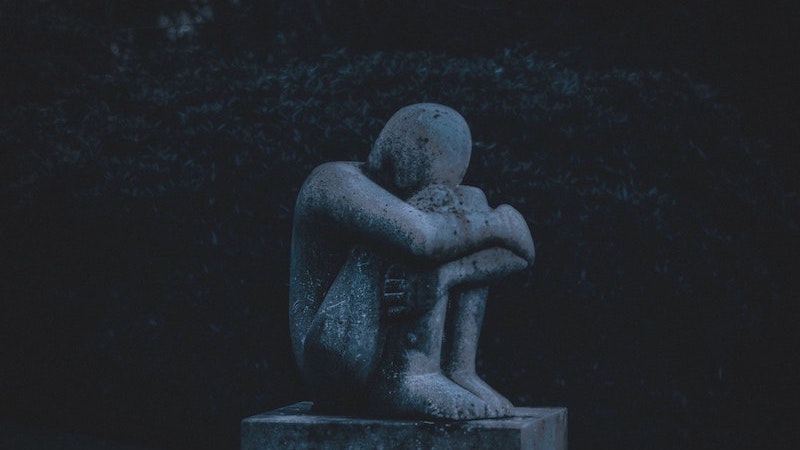Puberty shames teens into emotional stagnation
- 10 April 2021
- Posted by: Michael H Hallett
- Category: Patriarchy , Shame ,

In Patriarchy demands that our relationships are stagnant, I describe how our current human paradigm only survives by locking us into relationships that promise satisfaction but are in fact emotionally and sexually sterile. To achieve this, patriarchy has a mechanism for neutering each successive generation. Puberty shames teens into psychic stagnation.
With the onset of puberty, unconscious shame acts to shut down emotional and sexual growth to comply with patriarchal rules.
“The puberty problem”
Whether we’re parents or not, we’re all familiar with teenage behaviour. The sulking. The silence. The monosyllabic answers. The long retreats to their room, the slammed doors, the obsession with friends and physical appearance. These are the characteristics of puberty.
In Character Analysis, early psychoanalyst Wilhelm Reich writes: “Most of what official adolescent psychology considers the ‘characteristics of puberty,’ turn out in character-analytic work to be the artificially produced effect of obstructed natural sexuality.”
Reich reinforces this assertion in The Function of the Orgasm: “In puberty, the damaging principle of education is repeated, leading to psychic stagnation and character armouring… The puberty problem is socially and not biologically determined [Reich’s Italics].”
The birds and the bees
By character armouring, Reich refers to layers of physical, emotional and mental defence mechanisms that we adopt to survive the hostile environment of the patriarchal family unit. In patriarchy, all expressions of femininity are circumscribed, censored, suppressed or even violently punished.
One of the ways this happens—Reich’s “damaging principle of education”—is through the ritual of ‘the birds and the bees’. This talk is equally dreaded by parents and teens alike. It’s supposedly about ‘the facts of life’. In practice it’s mostly about transmitting patriarchal sex-negative morality from one generation to another. I’ve written about my own experience in The birds, the bees, and the fear of sex.
In response to this onslaught on the feeling aspects of being, teens undergo a process of unconscious, self-imposed repression. That’s what all the sulks, silences and monosyllabic grunts are about. The heartfelt spontaneity that young children naturally express slowly shuts down until a socially adjusted teen rolls off the end of the production line and emerges, blinking, from their darkened and messy bedroom.
Except that ‘socially adjusted’ means psychically stagnant. Why? Because if they underwent enough psychic growth, they would question the mechanism that neutered their growth.
Depersonalisation
The concept that puberty is “socially and not biologically determined” is largely unknown. Most people survive puberty with just enough damage to function in patriarchal society. Emotional stagnation is considered normal and has been normalised into invisibility.
Yet this process does have a name. It’s called Depersonalisation Syndrome (or Disorder). As a severe condition it’s thought to affect 1-2% of the population.
The World Health Organisation’s ICD-10, the International Statistical Classification of Diseases and Related Health Problems, describes Depersonalisation Syndrome as follows: “Among the varied phenomena of the syndrome, patients complain most frequently of loss of emotions and feelings of estrangement or detachment from their thinking, their body, or the real world.”
Our level of depersonalisation is directly related to our level of sensitivity. The more sensitive we are, the more acutely aware we are of the feminine aspects of our being and how they violate society’s unwritten moral codes of behaviour.
Puberty and shame
Which brings us to the heart of the emotional mechanics behind psychic stagnation—unconscious shame. Children are dependent on their families for survival. This creates a conflict of interest for the child. It learns to repress any behaviour that upsets their caregivers and potentially threatens the family unit.
Inappropriate sexual behaviour, particularly by women, has historically been a major cause of shame, difficulty and loss of social standing. With the onset of puberty, unconscious shame acts to shut down emotional and sexual growth to comply with patriarchal rules.
Deuteronomy 22:20-21 states: “If the man was right and there is no proof that his bride was a virgin… take the woman to the door of her father’s house and stone her to death.” Note that the woman must be taken to the door of her father’s house to be killed. This is because it’s the father, as the titular head of the family, who’s truly being shamed.
He’s being shamed for failing to produce a psychically stagnant, compliant daughter.
Zero emotional and sexual growth
Writing on childhood in Imperial Russia, history professor Patrick P. Dunn observed that, “the good of the family superseded that of any of its members”. The principle applies in all patriarchal societies, up to and including Western democracy.
Wilhelm Reich describes the generational cycle: “Children brought up in this way become character-neurotic adults who, in turn, pass on their neuroses to their own children.” As a result, since the dawn of patriarchyhumanity has been stuck in a phase of zero emotional and sexual growth. I’m going to close with a quote from that blog:
I’ve mentioned sexual growth a lot. Why is this important? For the simple reason that sexual energy is the energy that creates and animates life. When our sex lives are stagnant, our life energy is stagnant. It’s a playful energy that wants to dance with us, to break through stale patterns and bring freshness into our lives.
As long ago as 1932, Wilhelm Reich wrote: “Sexually awakened women, affirmed and recognized as such, would mean the complete collapse of the authoritarian ideology”.
It’s time for puberty to become a time of joyful growth and emergence for our teens, not one of shame and the unconscious repression of their individuality.
Next steps
For further resources on shame, both free and paid, please click on this image.
Photo by K. Mitch Hodge on Unspla


Having two teen boys this topic is very near and dear to my heart. Thank you, Brother.
Thanks Kate, I hear you.
One thing I do notice is how much healthier my teenage son is than I was. At his age I was already getting drunk regularly.